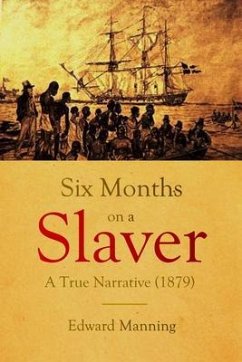"The horrors of the voyage...the woeful sufferings of its living freight are truthfully pictured by Mr. Manning, who was a sailor on board...the last slaver ever fitted out in the United States." -Boston Evening Transcript, March 29, 1879
"Edward Manning...afterwards wrote...an excellent description of life on board a slaver during the last days of slaving, with intimate details not sound elsewhere." - Slave Ships and Slaving (2013)
"Furnishes some very vivid pictures of slave ship life, slave catching, and the incidents of the voyage" -Quad-City Times, April 19, 1879
"Edward Manning...the author of 'Six Months on a Slaver'...had been in the crew of a black-ivory vessel, chased by British ships, a pirate...thought he was signing up for a merchant ship." -Brooklyn Daily Eagle, December 26, 1919
"Six Months on a Slaver" is a true narrative providing a realistic descriptions of the horrors of the slave trade experience of an American seaman, Edward Manning (1839-1919), who ships from New London, Conn., in 1860, on a three years' cruise, in an ostensible whaler, which proves to be a slaver on its way to the African coast.
It is a plain, unvarnished narrative of the manner of obtaining and of conveying a cargo of Africans from the African coast to Yucatan. Several instances of inhuman treatment inflicted on the poor slaves, and the general unpleasantness of the subject, work upon the sympathies too much to make it altogether pleasant reading; but the author tells his story simply, without aiming at producing any sensation, and it appears a faithful record of the way the debasing traffic was carried on.
In describing the scene when he realized he was on a slave ship, Manning writes:
"The crew generally seemed to be well pleased at the new phase the voyage had taken, and were anxious for the time to come when the ship would be well filled with 'blackfish' oil, as they termed the negroes, and her bow pointed toward the States. I did not share in their satisfaction at the changed aspect of affairs, for I had scruples about being made an outlaw in this summary manner, and I foolishly expressed my sentiments openly. I thus brought on myself the ill-will of the captain...."
Edward Manning (1839-1919) was a sailor from New London, Connecticut, who in 1860 signed on with the "whaling" ship "Thomas Watson" only to later find it was a "slaver" ship on a voyage to transport slaves from Africa to Yucatan. Manning wrote of his experiences aboard the slaver in his 1879 book "Six Months on a Slaver: A True Narrative."
About the author:
Edward Manning was born In New Brunswick, N. J., on November 2, 1839, and died December 23, 1919. As a youth he shipped as a seaman on what he supposed was a sailing ship, but which turned out to be the last slave ship which left the United States for Africa. In later years he become a well-known author, and one of his first successes was the took, "Six Months on a Slaver" detailing his experiences on the trip to Africa and what he saw there. He had traveled in many parts of the world, and another of his popular books was "The Far Seas of India." His articles for the magazines were notable for details of foreign peoples which showed him to be a man of keen observation. In the Civil War, Mr. Manning was in the service of the U. S. Navy on several vessels, was a chief gunner's mate and an acting ensign at the time he was honorably discharged from service in 1864. He was in command of the Little Ida, a gun-boat, at the Battle of Fort Fisher, and he was in many other battles, being wounded in one by a piece of exploding shrapnel, which struck him in the thigh. After the Civil War, Mr. Manning was for many years representative of the Oswego Starch Company.
"Edward Manning...afterwards wrote...an excellent description of life on board a slaver during the last days of slaving, with intimate details not sound elsewhere." - Slave Ships and Slaving (2013)
"Furnishes some very vivid pictures of slave ship life, slave catching, and the incidents of the voyage" -Quad-City Times, April 19, 1879
"Edward Manning...the author of 'Six Months on a Slaver'...had been in the crew of a black-ivory vessel, chased by British ships, a pirate...thought he was signing up for a merchant ship." -Brooklyn Daily Eagle, December 26, 1919
"Six Months on a Slaver" is a true narrative providing a realistic descriptions of the horrors of the slave trade experience of an American seaman, Edward Manning (1839-1919), who ships from New London, Conn., in 1860, on a three years' cruise, in an ostensible whaler, which proves to be a slaver on its way to the African coast.
It is a plain, unvarnished narrative of the manner of obtaining and of conveying a cargo of Africans from the African coast to Yucatan. Several instances of inhuman treatment inflicted on the poor slaves, and the general unpleasantness of the subject, work upon the sympathies too much to make it altogether pleasant reading; but the author tells his story simply, without aiming at producing any sensation, and it appears a faithful record of the way the debasing traffic was carried on.
In describing the scene when he realized he was on a slave ship, Manning writes:
"The crew generally seemed to be well pleased at the new phase the voyage had taken, and were anxious for the time to come when the ship would be well filled with 'blackfish' oil, as they termed the negroes, and her bow pointed toward the States. I did not share in their satisfaction at the changed aspect of affairs, for I had scruples about being made an outlaw in this summary manner, and I foolishly expressed my sentiments openly. I thus brought on myself the ill-will of the captain...."
Edward Manning (1839-1919) was a sailor from New London, Connecticut, who in 1860 signed on with the "whaling" ship "Thomas Watson" only to later find it was a "slaver" ship on a voyage to transport slaves from Africa to Yucatan. Manning wrote of his experiences aboard the slaver in his 1879 book "Six Months on a Slaver: A True Narrative."
About the author:
Edward Manning was born In New Brunswick, N. J., on November 2, 1839, and died December 23, 1919. As a youth he shipped as a seaman on what he supposed was a sailing ship, but which turned out to be the last slave ship which left the United States for Africa. In later years he become a well-known author, and one of his first successes was the took, "Six Months on a Slaver" detailing his experiences on the trip to Africa and what he saw there. He had traveled in many parts of the world, and another of his popular books was "The Far Seas of India." His articles for the magazines were notable for details of foreign peoples which showed him to be a man of keen observation. In the Civil War, Mr. Manning was in the service of the U. S. Navy on several vessels, was a chief gunner's mate and an acting ensign at the time he was honorably discharged from service in 1864. He was in command of the Little Ida, a gun-boat, at the Battle of Fort Fisher, and he was in many other battles, being wounded in one by a piece of exploding shrapnel, which struck him in the thigh. After the Civil War, Mr. Manning was for many years representative of the Oswego Starch Company.
Dieser Download kann aus rechtlichen Gründen nur mit Rechnungsadresse in A, D ausgeliefert werden.









